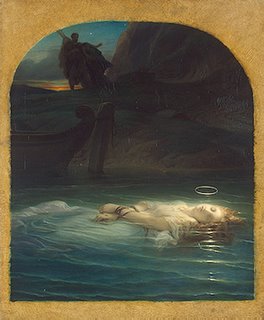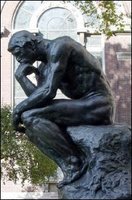I just realized I might add something by way of explanation. I'm back home on Christmas break, and finally have time to update my blog. Funny thing, at college there are so many real live people in front of me that I have little time for cyberspace.
That said, Spurgeon's sermons and Superman aren't the only things that are keeping my brain occupied. Four months away from home has taught me so many lessons, and I know I have so many more to learn.
Friday, December 22, 2006
something else to add
Posted by
the traveler
at
10:04 PM
1 comments
![]()
what the world needs

We were watching Superman Returns the other night, and one section of dialogue particularly caught my attention. During a encounter between Superman and Lois Lane (female heroine), Superman takes Lois flying way up high and asks her a question.
"Listen, what do you hear?"
Lois answers, "I don't hear anything."
And Superman says, "I hear everything. You wrote that the world doesn't need a savior, but everyday I hear people crying for one."
It's hard to see the Christmas story through fresh eyes when I've been hearing it for 19 years. Sitting tranquilly in my warm home with enough food, and warm clothes to wear, life doesn't seem that bad. Sin doesn't seem that bad. I can't hear anything. I can easily get lost in my Christian "bubble," and forget why I need Christ.
Take a step outside the bubble. Where there are countries at war. Where there are millions of orphaned children. Where people suffer the effects of AIDS. Where every so many seconds, some horrible crime is committed.
Where everyday, someone is crying for a Savior.
God hears everyone. He hears the single mother with three children in a homeless shelter, who is about to get kicked out. He hears the girl in Ethiopia whose country is ravaged by AIDS, who can't move up to the next grade. He hears a young man whose heart has been broken.
He sent us a Savior in an unlikely package: the child of a virgin mother.
"And she will bring forth a Son, and you shall call His name JESUS, for He will save His people from their sins.”-Matthew 1:21
Posted by
the traveler
at
8:38 PM
6
comments
![]()
Monday, November 20, 2006
"Little-Faith"
I never really expected to get anything out of a sermon written in 1885.
Yesterday wandering around my college library, I picked up a book of Spurgeon's sermons. I anticipated dry reading and was pleasantly surprised by a sermon I really needed, "the History of Littte-Faith."
I thought I'd share a few of the best parts...
A call to humility...
"Let no man think of himself beyond his own experience. Experience is the true gauge; and he who boasts of an untried faith is puffed up with vain glory. Stretch not your arm beyond your sleeve, lest it be frost-bitten."
The beauty of "Little-Faith"...
"Those who have greater faith know that they have found their Lord; they know that he is as the sun which cannot be hidden; they feel his warmth, and rejoice in his light; yet the keen hunger after Christ which goes with Little-Faith is an admirable thing, and the Lord himself hath blssed it...the eager longings of a trembling heart after the Lord Jesus are full of loveliness and fragrance, and are by no means to be despised."
Comfort for "Little-Faith"...
"He that believeth even with a little and a trembling believing, is safe beneath the guardian care of the Eternal God."
Spurgeon based his entire "History of Little Faith" sermon off of Matthew 14:31,
"And immediately Jesus stretched out His hand and caught him, and said to him, 'O you of little faith, why did you doubt?' "
Posted by
the traveler
at
4:39 PM
2
comments
![]()
Thursday, October 19, 2006
who are you to judge another?
To aid in comprehension, I regrouped some of these points, paraphrased in some cases, and directly quoted most points.
Human nature-the way things are
· We’re continually evaluating other people’s behavior, character and motives.
· The longer we have been a Christian, the stronger the urge to judge others.
· Another cause of a judgmental attitude as we age is our pride in our growth.
· Judging has a spirit of criticalness, meanness, pride, contempt, arrogance and judgment.
· Very few practices cause more problems and division in families, groups and churches than judging others does.
God’s Perspective
· The Pharisees’ big sin was judging others. Luke 7:36-39
· Jesus spoke against judging others more than any other sin. Luke 15:25-30
· We are all in various stages of growth. Accepting others is trusting God to grow and change others at His own pace. Romans 15:7, Matthew 18:10
· A judgmental attitude is particularly odious to God as He observes our life. Isaiah 65:5-7; 2 Samuel 6:23
· God is judge and that is a job that He is not going to share with us. James 4:11-12, 1 Corinthians 4:5, Romans 14:10-13
· God gives great mercy to those who resist the urge to judge others. Matthew 7:1, Luke 6:36-38
Judging-Implications for Our Lives
· When we judge others in our heart and mind, we will despise them, gossip about them, and treat them with contempt. Example: Michael judging David’s dancing. 2 Samuel 6:14-16, 20
· The more we judge others, the less we will grow in holiness. James 4:11-12
· Very few practices by Christians are more alienating to non-Christians than our proneness to judge others.
· We never pray for those we gossip about, and we never gossip about those we pray for. [taken from a separate sermon, but equally applicable]
Changing our Behavior
· A major key to breaking the bad habit of judging others is to pray for their sins, character flaws and weaknesses.
· We can evaluate other people’s behavior, character and motives for the purpose of encouraging them, praying for them, and gently motivating them. Ephesians 6:18, Hebrews 10:24, Galatians 6:1
Implications That Mercy Has On Our Lives
· As we pray for others instead of judging them, our understanding for them grows.
· As we pray for others instead of judging them, our wisdom in how to help and encourage them grows.
· We can be disciplining ourselves to thank the Lord constantly for all His mercy and grace, which will stir us to practice the same mercy and grace to others.
· The more mercy we give to others, the more mercy God will give to us at the “Judgment Seat of Christ” Romans 14:10-13, 2 Corinthians 5:10, Colossians 3:24-25
Posted by
the traveler
at
3:31 PM
2
comments
![]()
Saturday, October 14, 2006
control issues
Posted by
the traveler
at
4:38 PM
1 comments
![]()
Thursday, September 21, 2006
bride of Christ
The character qualities I'm looking for in a husband are ones that Christ already exemplifies.
I want a man who would be willing to die for me.
One Man, Christ, already did.
I want a man to protect me. I want someone who won't desert me.
Jesus is the ultimate protector. He will never leave me nor forsake me.
I want a man to spend the rest of my life with.
I already know who I want to spend eternity with.
Christ is my bridegroom.
Psalm 34:8-10
"Oh, taste and see that the Lord is good; blessed is the man who trusts in Him! Oh, fear the Lord, you His saints! There is no want to those who fear Him. The young lions lack and suffer hunger; but those who seek the Lord shall not lack any good thing."
Posted by
the traveler
at
4:47 PM
2
comments
![]()
Tuesday, September 12, 2006
refining fire
This Sunday I had the privilege of listening to a message titled, "Sensing God in the Storms of Life." The message had several good points, but one striking analogy.
The pastor explained the story of how silver is refined. Once the silversmith puts the silver in the fire, he doesn't take his eye off it. He doesn't let anything distract him. How does he know when the silver is perfect and pure? "I know the silver is pure when I can see my face reflected in it."
You will recall Bible verses that speak of God refining our hearts.
Psalm 66:10
"For You, O God, have tested us; You have refined us as silver is refined."
Daniel 11:34-36
"Now when they fall, they shall be aided with a little help; but many shall join with them by intrigue. And some of those of understanding shall fall, to refine them, purify them, and make them white, until the time of the end; because it is still for the appointed time."
Finally, the verse I found most powerful.
Zechariah 13:9
"I will bring the one-third through the fire, will refine them as silver is refined, and test them as gold is tested. They will call on My name, and I will answer them. I will say, 'This is My people'; and each one will say, 'The Lord is my God.' "
Posted by
the traveler
at
7:53 PM
3
comments
![]()
Friday, September 08, 2006
one desire, one focus
This last week has been an incredible time of growing and learning, of seeking God and relying on Him. The theme for my dorm hall is the bride of Christ. I'm so used to being dependent on my family, that it has become a crutch. It's hard and yet really good and important to learn to be on my own.
One verse has really stood out to me this week,
Psalm 73:25-26
"Whom have I in heaven but You? And there is none upon earth that I desire besides You. My flesh and my heart fail; but God is the strength of my heart and my portion forever."
I am praying that God will help me to seek Him and rely on Him only.
Psalm 119:10
"With my whole heart I have sought You; oh, let me not wander from Your commandments!"
Posted by
the traveler
at
12:28 AM
1 comments
![]()
Monday, September 04, 2006
chivalry

I turned over a couple of jewels in my blog surfing today on the subject of chivalry. Hannah Beth of Beauty from the Heart wrote a post titled "Chivalry is Dead"...a Commentary." She uses a teacup analogy which I would encourage you to read. Krista, from Musings of a Lady, posted a link to an inspiring story about ladies.
These two posts reminded me of a policy here at my college. During orientation evening, we were informed that girls could pick up a safety whistle at the student life office. Girls were warned to blow the whistle only in an emergency. Guys were told that they were expected to come running and protect the ladies here if they heard a whistle blowing.
I was impressed by this public expectation that guys would protect the ladies around them, but I've also been struck by the care the guys here take to open doors for girls.
Picture credit
Posted by
the traveler
at
2:04 PM
1 comments
![]()
Friday, September 01, 2006
MySpace is Everyone'sSpace
At chapel this morning, our student body received an interesting annoucement. Last year, MySpace and Facebook were banned on campus. This year they've decided to unban both, but with a little catch. Apparently the college has everyone's MySpace on file and during every chapel, they will put some random MySpace up on the projector screen.
Although I don't think MySpace or any space for that matter is inherently evil, I do see a lot more objectional material there. I have a feeling everyone will be updating their MySpaces today. Even if the content isn't bad, it could be personal.
Our campus pastor said that the purpose of this measure was to hold everyone accountable.
What do you think about this decision? Should this be left up to the students? Should the college be monitoring this?
Posted by
the traveler
at
1:29 PM
2
comments
![]()
Tuesday, August 29, 2006
so much more

I am almost all moved into my dorm room! In between various events, fairs, and staying up way too late, I'm not getting much sleep. Maybe I'll catch up on the weekends. I've made a lot of new friends.
Some friends and I were in the car today when I had a thought. There a lot of Rachels here at college, and I thought of Rachel in the Bible. We don't hear much about her spiritual life. It reminded me of that verse in the Bible that says that too many things happened to document (if someone knows where this verse is, please let me know). We probably haven't even touched the tip of the iceberg as far as reading about the miracles Jesus performed.
Edit: Elizabeth Moore of Study.Quiet provided the Bible verse (thanks!) reference.
"Now there are also many other things that Jesus did. Were every one of them to be written, I suppose that the world itself could not contain the books that would be written."John 21:25
Anyway, that's my thought for the day. Other than that, ice cream socials are fun...although more fun when you aren't shivering in your sweatshirt.
Posted by
the traveler
at
8:35 PM
2
comments
![]()
Friday, August 25, 2006
Off to College!

Well, it's my last night in my own bed for a long while. I'm off to a small Christian college in the Northwest. This will be my junior year, so college isn't entirely new to me, but the dorm experience will be!
I expect to be very busy while I'm getting settled in and until I get used to taking 17 credits.
Until then, may the grace of God be with you all.
Posted by
the traveler
at
8:55 PM
1 comments
![]()
Wednesday, August 23, 2006
another one of those

Just when you thought another diet couldn't exist...
Stephen Lanzalotta creates the "Da Vinci Diet" and writes The Diet Code: Revolutionary Weight-Loss Secrets from Da Vinci and The Golden Ratio. Click to read the complete article.
Posted by
the traveler
at
9:17 PM
2
comments
![]()
Monday, August 21, 2006
God is working on me
Sometimes I don't feel like God hears my prayers. Sometimes I think God is angry with me and won't answer my prayers. But this week God has certainly heard me. I was thankful and happy for His help in time of need-a practical matter, I lost something, and now it is found.
I also requested that the Holy Spirit would remind me when I committed particular sins. But I forgot that God's answer might not be quite what I had in mind.
Ask and you shall receive.
It hurts. But I know God loves me. My Father chastens the ones He loves.
Posted by
the traveler
at
12:10 AM
2
comments
![]()
Saturday, August 12, 2006
living water
I'm back! I spent the last week camping with my family, and we were able to see a variety of God's creation, including a black bear!
We camped at two different locations, and both times were able to be close to a water feature. We actually spent two nights next to this waterfall.
All that water reminded me of when Jesus spoke to the Samaritan woman.
John 4:10, 13-14
"Jesus answered and said to her, 'If you knew the gift of God, and who it is who says to you, 'Give Me a drink,' you would have asked Him, and He would have given you living water.' "
"Whoever drinks of this water will thirst again, but whoever drinks of the water that I shall give him will never thirst. But the water that I shall give him will become in him a fountain of water springing up into everlasting life."
Posted by
the traveler
at
11:47 AM
2
comments
![]()
Tuesday, August 01, 2006
Heart: Part II
Heart: Part II continued from Heart: Part I
The Heart Must Be Conformed to God
The Bible says that our hearts are desperately wicked and for that reason, we must ask God to help us mold them into hearts that follow Him. In seeking to become like God, one must study and understand the heart of God. What do we know about God? He hates sin. This type of examination is painful. Our hearts do not naturally desire God and His precepts. We need to seek conformity with God, not to this world. Psalm 84:5 says, “Blessed are those whose strength is in you, who have set their hearts on pilgrimage.”
The Heart Must be Protected
We hear about guarding our hearts, protecting our purity, putting on the full armor of God. Ephesians 6:12-13 writes,
“For we do not wrestle against flesh and blood, but against principalities, against powers, against the rulers of the darkness of this age, against spiritual hosts of wickedness in the heavenly places. Therefore take up the whole armor of God, that you may be able to withstand in the evil day, and having done all, to stand.”
We protect our hearts that they may remain sensitive to the evils of sin, and not callused.
Imagine the heart is like a castle. Although the king of the castle may have lands and people that lie outside its boundaries, the castle is the main fortress. If those castle walls are strong, well maintained, and well guarded, then the enemy will be hard put to enter. However, if the walls have been broken down, the gate breached, and the guard sleeps, then it will be easy to conquer that castle. So it is with your heart. What things have crept into your life that compromise the “security” of your heart?
In C.S. Lewis’ Screwtape Letters, the senior devil, Screwtape, advises his nephew that the best way to bring a man down is not to confront him directly, but wear him down. Screwtape writes,
“We know that we have introduced a change of direction in his course which is already carrying him out of his orbit around the Enemy; but he must be made to imagine that all the choices which have effected this change of course are trivial and revocable.”
Luke 11:21 says, “When a strong man, fully armed, guards his own house, his possessions are safe.”
The Result of Heart Work
Jeremiah 24:7 says, “I will give them a heart to know me, that I am the LORD. They will be my people, and I will be their God, for they will return to me with all their heart.”
If we live in accordance with God’s word, loving Him with all our heart and soul and mind, then we will be able to say, “Lord, you have my whole heart.”
Posted by
the traveler
at
7:08 PM
3
comments
![]()
Friday, July 28, 2006
Heart: Part I
Who Has Your Heart?
The heart has four chambers and pumps blood throughout our physical bodies. Each day, the average heart pumps about 2,000 gallons of blood. There’s another kind of heart—our spiritual hearts. They’re nothing pretty to look at. God said in Genesis, “Never again will I curse the ground because of man, even though every inclination of his heart is evil from childhood.” There’s an absolute statement in that verse: “Every inclination of his heart is evil.”
In the chapter of Practical Christianity titled “Heart Work,” Arthur W. Pink uses the verse from Proverbs 4:23, “Keep thy heart with all diligence.” I found the “Heart Work” section of Pink’s book helpful, especially in light of the idea that the heart is the wellspring of life.
The dictionary defines wellspring as, “a source, an abundant source.” One might say the heart is the source of life. In Practical Christianity, Pink writes, “If our heart be the residence of impiety, pride, avarice, malice, impure lusts, then the whole current of our lives will largely be tainted with these vices.” Although Pink’s comments on this topic are extensive, I find three points I think best summarize his discussion. The heart must be tended. The heart must be conformed to God. The heart must be protected.
The Heart Must be Tended
Like a garden, the heart requires continual work. Sin must be rooted out, encouragement watered on, and nourishment from God’s word applied. Imagine a garden planted on the edge of a forest, overgrown with brambles, weeds, and the entangling roots of the buttercup. The surrounding environment is not conducive to healthy growth. More than likely, the garden will become overwhelmed and taken over by weeds. A while ago I quit a weekly social visit to the newspaper office I worked for, because I found that the ensuing conversation had a negative impact on my soul. Although I feel secure in my knowledge of the truth, the very environment caused my thoughts to be angry, resentful, and sinful.
Examine your heart. What sin needs to be exposed and destroyed? Each day, meditation on God’s word and prayer are essential. Often I do truly hunger for God’s word, wanting something more than this world can offer, needing more than lies, platitudes, and relativity. I need truth. Like a deer pants for water, so my soul pants for God. In my own life, I find that when I’m careless or sloppy about communing with God, my spiritual well being suffers. I require constant help from God to feel loved, to feel cheerful, and to remember God’s truth.
In the Old Testament, one can see the Israelites constantly falling away. They required constant reminder of God, what He expected from them, and what He had done for them. As a child I found myself scornful of the Israelites frail moral character, but now I empathize with their plight. I believe one of the reasons the Israelites occupy a large portion of the Bible is to remind us of our tendency to be forgetful.
To be continued...
Posted by
the traveler
at
6:24 AM
2
comments
![]()
Saturday, July 22, 2006
Reliability of the Bible: Part III
The Bible: The Most Bibliographically Verified Source in History
continued from Reliability of the Bible: Part I, and Reliability of the Bible: Part II
Same Theme all the way through
The continuity of the Bible amazes me.
66 different books
40 different authors
3 different languages
Written over a 1500 year time span
Same message, same God, same Savior
2 Timothy 3:16-17, “All Scripture is given by inspiration of God, and is profitable for doctrine, for reproof, for correction, for instruction in righteousness, 17 that the man of God may be complete, thoroughly equipped for every good work.”
Secular Writings
Dr. Phil Fernandes took some time to point out several ancient secular writers who confirmed the message of the New Testament.
Thallus (52 A.D.) wrote about the darkness of the sky when Jesus died
Mark 15:33-34, “Now when the sixth hour had come, there was darkness over the whole land until the ninth hour. And at the ninth hour Jesus cried out with a loud voice, saying, ‘Eloi, Eloi, lama sabachthani?’ which is translated, ‘My God, My God, why have You forsaken Me?’ ”
Tacitus (115 A.D.) wrote about Christ’s death and the 50 day gap before the explosion of Christianity
Acts 2:41, “Then those who gladly received his word were baptized; and that day about three thousand souls were added to them.” [on the day of Pentecost after Jesus’ ascension into heaven]
Josephus (37-97 A.D.) hired by the Romans to record Jewish history, says he used to visit Noah’s Ark on Mt. Ararat
Genesis 8:3-4, “The water receded steadily from the earth. At the end of the hundred and fifty days the water had gone down, and on the seventeenth day of the seventh month the ark came to rest on the mountains of Ararat.”
Talmud (70-200 A.D.) talks about Jesus as illegitimate and a sorcerer.
Acts 2:22, “Men of Israel, hear these words: Jesus of Nazareth, a Man attested by God to you by miracles, wonders, and signs which God did through Him in your midst, as you yourselves also know…” [emphasis mine]
Common Experience of Christians
Since Jesus’ resurrection, millions of people have come to know Christ as their Lord and Savior. Each person is an eyewitness to the miracles that God performs in their own lives the lives of others. Every true Christian has a personal relationship with Jesus.
At Worldview Academy, I felt incredibly encouraged by the presence of so many young Christians. At a Christian leadership camp, it’s reasonable to expect that almost everyone is a Christian. That knowledge—that all these people believe the same truth I believe and that we all love the same Savior—fills me with joy.
***********
Resources
The Bible
The New Evidence by Josh McDowell
Thy Word is Truth by E.J. Young
The New Testament Documents by F.F. Bruce
http://www.everystudent.com/features/bible.html
http://www.godandscience.org/apologetics/bibleorg.html
http://www.godsaidmansaid.com/topic3.asp?Cat2=262&ItemID=555
http://www.biblicaldefense.org/Writings/old_testament_reliability.htm
http://biblicaldefense.org/
Note: All Biblical references are from the New King James version.
Posted by
the traveler
at
11:58 AM
2
comments
![]()
Friday, July 21, 2006
Reliability of the Bible: Part II
The Bible: The Most Bibliographically Verified Source in History
continued from Reliability of the Bible: Part I
Archaeology
Jay Winslow pointed to three (among many) archaeological discoveries which confirmed what the Bible says: Hittites, Assyrians, and Jericho.
Hittites
Joshua 1:4, “From the wilderness and this Lebanon as far as the great river, the River Euphrates, all the land of the Hittites, and to the Great Sea toward the going down of the sun, shall be your territory.”
In 1906, Hugo Winkler found the Hittite civilization. These people are spoken of in the Bible, but people had previously said that the Hittites didn’t exist.
Assyrians
Isaiah 19:23, “In that day there will be a highway from Egypt to Assyria, and the Assyrian will come into Egypt and the Egyptian into Assyria, and the Egyptians will serve with the Assyrians.”
Similar to their disbelief of the Hittites, people also thought the Assyrians didn’t exist. Since then, the entire city of Nineveh (one of the major, ancient Assyrian cities), has been unearthed.
Jericho
Hebrews 11:30, “By faith the walls of Jericho fell down after they were encircled for seven days.”
In the Bible, Jericho is famous for its miraculous destruction. The Israelites marched around the walls once a day for six days, then on the seventh day marched around it seven times. After the final march, the priests blew trumpets, the people shouted, and the walls fell down.
In a normal siege, the walls would fall inwards as the attackers surged in that direction. Garstang, the archeologist who excavated Jericho, said, “As to the main fact, then, there remains no doubt: the walls fell outwards so completely that the attackers could be able to clamber up and over the ruins into the city."
How can this be? God’s miraculous hand at work.
Prophecy
Isaiah 46:9-10, “I am God…Declaring the end from the beginning, and from ancient times things that are not yet done.”
In the Old Testament, over 2,000 predictive prophecies have been fulfilled. 333 of these prophecies concern Christ. Jay Winslow spoke about a man who decided to research the chances the one man could fulfill just eight of the 333 prophecies that Jesus fulfilled.
I wasn’t able to write down all eight, but I do have six of The Eight Coincidental Prophecies:
Born at Bethlehem
Preceded by a messenger
He was to enter Jerusalem on a donkey
Betrayed by a friend for 30 pieces of silver
Money thrown into God’s house and given for potter’s field
Silent before accusers
What are the chances?
1 in 10 to the 17th power. That’s like covering the state of Texas two feet deep in silver dollars, marking one silver coin, and allowing someone in a helicopter to select one of those coins [example from Jay Winslow].
And that’s just eight prophecies. The chances of a man fulfilling 48 prophecies? 1 in 10 to the 157th power.
Jesus fulfilled all 333 prophecies about the coming Messiah.
To be continued...
Posted by
the traveler
at
2:07 PM
2
comments
![]()
Wednesday, July 19, 2006
Reliability of the Bible: Part I
Lecture Compilation and Summary
During my week at Worldview Academy (WVA), my favorite lecture was “Reliability of Scripture,” given by Jay Winslow. Although I’ve been brought up my entire life to trust the Bible, sometimes I’ve wondered why I should believe the Bible.
How do I know that it’s true?
Several months ago, during the first day of my sociology class, our professor told us to come with an open mind, leaving our religion and biases at the door. I believe she did this because it some sense, she did not believe that faith and reason are compatible. WVA lecturer Jay Winslow, pointed out a common assumption of unbelievers, “If you believe in the Bible, you’re a little bit wacky.”
Jay Winslow’s lecture succinctly pointed out two important parts of determining the reliability of scripture: MAPS and the common experience of Christians. He demonstrated that Christians do not have faith without reason, they have reasonable faith.
Although I very much appreciated the format of Jay Winslow’s lecture, subsequent lectures by Dr. Phil Fernandes provided additional information, which I incorporated into this summary. I also referenced the Bible, several web sources, and my personal experience.
MAPS
By MAPS, Jay Winslow didn’t actually mean a picture diagram of the world. MAPS stands for Manuscripts, Archaeology, Prophecy, and Same theme all the way through.
Manuscripts
Jay Winslow provided an excellent quote from John Warwick Montgomery,
“To be skeptical of the resultant text of the New Testament books is to allow all of classical antiquity to slip into obscurity, for no documents of the ancient period are as well attested bibliographically as the New Testament.”
Worldwide, students learn a huge quantity about ancient history, much of which doesn’t have huge amounts of manuscript copies to back it up. During the lecture, students had the opportunity to see a table in the slideshow presentation, which provided numbers of copies for various historical documents.
Author, Work, Number of Copies
Homer, Iliad, 643
Herodotus, History, 8
Thucydides, History, 8
Caesar, Gallic Wars, 10
Various, New Testament, 5366
The last listing in the table shows the New Testament with 5,366 copies. However, that number only encompasses Greek manuscripts. All together, the New Testament has 25,000 manuscripts.
Dr. Phil Fernandes pointed out that there is 99.5% agreement between the 25,000 New Testament copies. That means that 5 words in 1000 are called into question. By comparison, there is 95% agreement between Homer’s Iliad copies. That means that 50 in 1000 are called into question.
In short, the New Testament is 10 times more accurate than the Iliad.
For the sake of space and time, I can’t go into Old Testament accuracy here, but Dr. Phil Fernandes has provided a chapter from his doctoral dissertation on this subject at http://www.biblicaldefense.org/Writings/old_testament_reliability.htm.
Posted by
the traveler
at
5:01 PM
2
comments
![]()
Sunday, July 09, 2006
Worldview Academy
That's the goal of Worldview Academites. I'll be attending WVA this week, so there will be yet another lull in posting. I would encourage you to check out their website. When I return, I'll be posting on the many things I expect to have learned at WVA.

Posted by
the traveler
at
1:18 PM
2
comments
![]()
Wednesday, June 28, 2006
quote of the week

"The New York Times (proudly publishing all the secrets unfit to spill since 9/11) and their reckless anonymous sources (come out, come out, you cowards) tipped off terrorists to America's efforts to track their financial activities.”
-Michelle Malkin, “The Terrorist-Tipping Times”
Blabbermouth New York Times. They’re at it again…sinking ships with their loose lips. In the last two days, Townhall alone has published seven columns on the disregard the NY Times has shown for national security.
It almost makes a person wonder if the NY Times is actually written by terrorists.
Posted by
the traveler
at
9:18 PM
4
comments
![]()
Saturday, June 24, 2006
Found: WMDs
For months, war protestors have been shouting, "No WMDs!" The Left has relentlessly harassed President Bush for lying about their existence and using that as a ploy to bring the US to Iraq.
Fox News reported Thursday that a declassified report from the National Ground Intelligence Center revealed that since 2003, the US has uncovered over 500 WMDs.
Admittedly, I have felt doubtful about the presence of WMDs, but not about President Bush's intentions for the War on Terror. In light of what I've learned, I have renewed trust in our president.
Posted by
the traveler
at
4:05 PM
0
comments
![]()
Friday, June 23, 2006
30.00

30.00. It must be a special day. And that number will mean something in a moment.
At the crack of dawn this morning, I hauled myself out of bed and got ready for work. (4:45 a.m.) I always hate buying gas now for a multitude of reasons.
One, the outrageous prices. It’s practically an occasion for gnashing one's teeth. Two, I always have to do it at an inconvenient time. Sometimes I think, Oh I’ll buy gas after work. Fat chance. When I get home around 4 pm, I’ve already sat through some traffic, and I know there’s a line at the gas station. So then I think, Oh I’ll buy gas before work. Big fat chance. At 5:20 a.m., I totally don’t feel like standing outside in the cold for five minutes paying an exorbitant price for gas.
I put off buying gas for yet another day, and then one day realize that my tank is empty, so I’m forced to purchase gas at another inconvenient time so I’m late for work.
But, that doesn't have much to do with 30.00.
Today, I knew I had to buy gas, and I even left enough time to do so. Not only that, but as I drove up to the gas station, the sign read $2.89 for unleaded. Cheap! I could have danced for joy.
Not only that, but the gas gauge stopped exactly at $30.00. What are the odds of that? I survived my gas adventure and the sun shines in full glory. It’s going to be a good day.
Posted by
the traveler
at
3:28 PM
2
comments
![]()
Thursday, June 22, 2006
new layout
As you've probably noticed, I've switched blog templates (at least temporarily). Please let me know what you think! I've been feeling like the post font on my other template is too small to easily read. I'm trying to make my blog more reader friendly.
Hate it? Love it? Too boring?
Posted by
the traveler
at
8:47 PM
3
comments
![]()
united they stand
Looking at Google headlines this morning, I came across a story by Liz Sidoti, “Democrats, Republicans Spar Over Iraq War,” focusing on statements Democrats made about the polarity of opinion about Iraq. One quote in particular snagged my attention.
" 'One hundred percent of the Democratic caucus believes it's time for change. One hundred percent of the Republican caucus believes it's time to stay the course,' Sen. Dick Durbin, D-Ill., said during debate, voicing the Democratic view of the likely vote outcome as well as the choice facing voters this fall."
Durbin seems to have already forgotten last week’s vote on an amendment for a timetable to pull troops out of Iraq. The House voted 256-153 rejecting the amendment. The Senate voted 93-6 against the amendment.
Last time I checked (last week), Democrats weren’t solidified in their stance to pull out of Iraq. Let’s take a look at those percentages. 63% of the House voted against. 94% of the Senate voted against. Don’t try to tell me there are only six Democrats in the Senate.
On a related note, I just realized that Senator Durbin is the same man I wrote about in January [see “Alito confirmation questions-is he musical?” ]. Durbin questioned Supreme Court Justice Alito because he wouldn’t reveal his musical preferences.
If “One hundred percent of the Democratic caucus believes it's time for change,” then there wouldn’t have been such a huge majority vote against the Iraq timetable amendment.
Solidarity? I think not.
Posted by
the traveler
at
8:44 PM
1 comments
![]()
Tuesday, June 20, 2006
a deadly future

I recently viewed the movie Gattaca, a sci-fi movie, in which society analyzes each human's DNA to determine their status in life. The hero, Vincent Freeman (played by Ethan Hawke), works as a janitor because of a heart defect. In direct contrast, Vincent's parents carefully select their second son for desirable traits to achieve as much perfection as possible. Vincent's longing to go into space causes him to decide to disappear from society, undergo dramatic physical changes, and re-emerge as someone with the "right" DNA to go on a space mission.
While watching the film, I felt aware of our society's trend towards these kind of practices, but didn't realize just how far we've fallen. Yesterday, Guardian Unlimited published "Improved Embryo Test Cuts Risk of Hereditary Illness."
"British scientists announced today an advanced screening test for embryos, using a form of DNA fingerprinting, which could help prevent couples passing inherited disorders such as cystic fibrosis on to their children."
This screening test won't prevent couples from passing inherited disorders on; instead it will involve the elimination and death of children with those inherited disorders.
We're closer to Gattaca than I thought.
Posted by
the traveler
at
9:01 PM
2
comments
![]()
Thursday, June 15, 2006
quote of the week (or the sometime inbetween)

"Our media today seem absolutely allergic to good news, especially when it comes to Iraq."-Brent Bozell
In his column titled "No TV Time for Heroism and Victories," Bozell highlights the media's scanty and pessimistic coverage of the Iraq war .
Posted by
the traveler
at
7:20 PM
1 comments
![]()
Tuesday, June 13, 2006
coffee

There is such a thing as a good coffee story. There’s the one about my dad, who is the ultimate coffee connoisseur with his gourmet roasted coffee. Or the story my mom likes to tell about when she was a child, and she knew *one* family with an espresso machine. I personally like my tale of downing a tall black coffee in 10 minutes and being unable to stop moving afterwards. Sometimes these aren’t so much stories as juicy rumors. Like the one about the coworker whose coffee cup never gets washed. Can I just say—GROSS!
I clung to my clean coffee cup righteousness façade as though I would always keep my cup in the best of conditions. I say clung, because my claim on coffee cup purity is now a thing of the past. As I sit at my desk, I’m looking down into my coffee cup, which isn’t particularly dirty, but is graced by a dark, brown swirled film of coffee remains (Folger’s, Coffeemate creamer, and Equal sugar). The red straw I stirred that coffee with three (it could be five days, I couldn’t say) days ago, is actually stuck to the bottom of my cup.
This particular coffee cup has the “love verse” from Corinthians printed on it, and I’m just thankful it doesn’t say love is not lazy. The only problem with my work location is the distance from my desk to the mini kitchen. Sometimes it takes a lot of nerve to walk a dirty cup across the hall. I wouldn’t want anyone to actually find out what a loaf I am. Since I’m not actually so slothful that I would pour fresh coffee on icky sticky coffee goo, I’ll probably have to give up and wash my cup tomorrow when I want more coffee. Or, I’ll just bring in another cup.
Posted by
the traveler
at
4:42 AM
2
comments
![]()
Thursday, June 08, 2006
rose in bloom

"God has sown his name on the heavens in glittering stars; but on earth he planteth his name by tender flowers."-Jean Paul Richter
Posted by
the traveler
at
5:59 AM
2
comments
![]()
Wednesday, June 07, 2006
good art illustrated
After my post about how good art should be defined, I thought it would be appropriate to provide an example of good art. This painting, “A Christian Martyr Drowned in the Tiber During the Reign of Diocletian,” fulfills the three requirements I listed: skill, beauty, and an explanation of life.
I found this painting on The State Hermitage Museum website, which has a wide variety of art including sculpture, artifacts, painting, and watercolor.
"A Christian Martyr Drowned in the Tiber During the Reign of Diocletian"
This is an oil painting done in 1853 by Hippolyte Delaroche (commonly called Paul).
I looked up Diocletian (person in the title of painting), and found that he reigned as emperor over the Roman Empire from A.D. 284-305. Along with Constantine, he established an absolute monarchy. Diocletian demanded absolute respect from his subjects. Some time toward the late period of his reign, Diocletian issued an edict that “all churches should be demolished, that the sacred Scriptures should be burned, that all Christians should be dismissed from public office, and that those who secretly met for public worship should be punished with death.”
Posted by
the traveler
at
7:25 PM
1 comments
![]()
Monday, June 05, 2006
marriage amendment
This weekend, President Bush impressed me with his stand in protection of the institution of marriage. On June 7th, just two days away, the US Senate will be considering a Constitutional amendment that would define marriage as union between a man and a woman.
According to a poll from the Pew Research Center for the People and the Press, 63 percent of Americans opposed gay marriage in February 2004. The articles I read from the MSM regarding the upcoming debate didn’t sound hopeful about the passage of such an amendment. In “Bush Backs Amendment Banning Gay Marriage,” Nedra Pickler wrote, “It [the amendment] stands little chance of passing the 100-member Senate, where proponents are struggling to get even 50 votes. Several Republicans oppose the measure, and so far only one Democrat _ Sen. Ben Nelson of Nebraska _ says he will vote for it.”
In previous posts, I've focused on marriage and homosexuality.
Marriage Keeps People Healthy, Wealthy and Wise
A Great Evil
Orson Scott Card also wrote an excellent article on this topic, “Homosexual 'Marriage' and Civilization.” He explains what the breakdown of the family and traditional marriage will do to our society.
What do you think? Should the protection of marriage be a federal or state issue?
Posted by
the traveler
at
8:08 PM
1 comments
![]()
Monday, May 29, 2006
sacrificial defense

"Greater love hath no man than this, that a man lay down his life for his friends."
Posted by
the traveler
at
9:32 AM
2
comments
![]()
Sunday, May 28, 2006
created in His image

While surfing the Worldview Academy blog, I discovered this video from the Discovery Channel, "Baby Cries in Womb."
Psalm 139:13-16
"For you created my inmost being; you knit me together in my mother's womb. I praise you because I am fearfully and wonderfully made; your works are wonderful, I know that full well."
Posted by
the traveler
at
10:20 AM
1 comments
![]()
Saturday, May 27, 2006
"free" healthcare

In his May 1st speech, President Bush said, “To make our health care system work for all Americans, we have to choose between two philosophies: one that trusts government to make the best decisions for the people's health care, or one that trusts the people and their doctor to make the best decisions for their health care.”
Some countries, like Canada, have already adopted socialized subsidized healthcare system. Should the United States provide free healthcare to her citizens? Although some speculate that free healthcare is a basic human right, I believe that such a service would be detrimental to American citizens. A federally controlled program would perform inadequately, acquire excessive power, and result in wasted funds.
Uncle Sam has demonstrated ineptness in many areas such as our education system, where public school quality continues to deteriorate. The Boston Globe quoted Barry McGaw saying, “Given what the United States spends on education, its relatively low student achievement through high school shows its school system is ‘clearly inefficient.’ ”
Lack of healthy competition causes this problem, because without it, the government doesn’t have incentive to offer better care, lower prices, or faster service. Federal Trade Commission (FTC) Chairman Timothy J. Muris said, “Healthy competition equals healthy consumers. Consumers want high-quality, affordable, accessible health care, and the challenge of providing it requires new strategies.” If all citizens received free healthcare, quality would decline and competitors would disappear. Who can compete with free?
With a socialized healthcare system, control of it would be nationally concentrated. Executive Director of Americans for Free Choice in Medicine, Richard E. Ralston, explained the risks of this type of system. Among other problems, surrendering medical care to the government would diminish freedom of choice and result in even more mandatory fees. Choice is imperative to liberty. Without it, freedom is meaningless. The more dependent Americans become, the more liberties they give away.
Walter E. Williams, the John M. Olin Distinguished Professor of Economics, wrote that in desperation, Canada had outlawed private healthcare insurance in order to sustain the unpopular, socialized government healthcare. If this happened in the US, independent healthcare providers would likely go out of business, leaving Americans with fewer options.
Finally, free healthcare wouldn’t really be free. Just like social security, “free” healthcare would be tax funded. With the national debt now over 8 trillion dollars, Uncle Sam doesn’t need to be spending any more money. Yet that’s just what giving all citizens free healthcare would do. Given governmental inefficiency, the government would undoubtedly charge inefficient prices for healthcare. Not only would it cost taxpayers more money, but without directly paying for healthcare, citizens would likely misuse it.
Those laboring under the delusion of “free healthcare” should open their eyes. It won’t be healthy, it won’t be free, and it won’t be freedom. The more liberties America’s citizens retain the better.
Posted by
the traveler
at
10:56 AM
2
comments
![]()
Tuesday, May 23, 2006
Defining Art

In 2004, Cosimo Cavallaro spread 315 lbs of sliced deli ham on a four poster bed. He called this art. I call this dumb.
Many people join with me in questioning the artfulness of Cavallaro’s work. What then is art? Fred Ross, chairman of the Art Renewal Center, wrote the essay, “Bad Art/Good Art,” saying, “Well, if everything is art, then nothing is art. Any definition that includes everything is not a definition at all.”
I propose a more exclusive definition of art: the skillful, conscious production of aesthetic material which beautifies and explains life.
According to Dictionary.com, artistry requires skill: a superior skill that you can learn by study and practice and observation. Much modern artwork, such as Cavallaro’s “ham bed” or Chris Ofili’s “The Virgin Mary” (made of several materials including elephant dung), doesn’t demonstrate skill. Ross describes the modern art philosophy, “Whether you dribble little dollops of colors or drag fat uneven slashes of black...The effect is always the same. MEANINGLESS PRIMITIVISM.” The ability to accurately and vividly portray a landscape now pales in the face of defecatory material smeared over a poorly depicted representation of the Virgin Mary. True art should be valued for the artist’s mastery of the medium.
Good art is beautiful. People buy sculptures, hang photos, and admire paintings because they are lovely. The Artist of this world, God, created a planet so vibrant and visually pleasing that humans endlessly enjoy trying to capture their own representation of it. Whether delighting in a bright yellow daffodil, the way the sun hits the edge of a cloud, or the black-purple colors during a thunderstorm, we appreciate the aesthetic value of the earth. Vincent Van Gogh’s “Starry Night” depicts a night sky glowing with stars. Although anyone might observe a starry night, Van Gogh drew attention to potentially unnoticed beauty. Georgia O’Keeffe painted flowers close up, giving care to tiny details like the black centers of two poppies.
Finally, some art doesn’t qualify as beautiful, but can be valued because it seeks to explain life. My art professor believes that good art provides answers. There is value in compositions which portray suffering, because they explain the realities of life. Jean-Léon Gérôme’s painting “Pollice Verso” portrays a crowd giving the thumbs down in a gladiator fight. Can you say that this painting is beautiful? Not really, but one can see the work as an explanation of Roman life at the time.
Given the subjective nature of art, its quality will always be debated. However, if artists demonstrate skill in their work and the art beautifies or explains life, there’s a good possibility that the art has value. Just don’t expect me to be impressed if you call a bloody, crumpled up piece of Kleenex art.
Posted by
the traveler
at
9:41 PM
2
comments
![]()
Monday, May 08, 2006
grateful for mercy
“ ‘Why,’ she said, ‘we are just the same—I am only a little girl like you. It’s just an accident that I am not you, and you are not me!’ ”Sara Crewe from A Little Princess (written by Frances Hodgson Burnett), said these words to the scullery maid, Becky.
Her words remind me of how grateful I ought to be. Although my role in this world is certainly no accident, but rather predestined by God, I do count myself blessed. Who knows why God chooses to put certain people in particular places?
The Bible clearly states in Romans 3:10-11, “There is none righteous, no, not one; there is none who understands; there is none who seeks after God.”
Nothing in me merits the fact that I’m living comfortably in America with anything I could possibly want. Besides that I know God planned it that way, there’s no particular reason why I was born in America instead of being born in Africa with AIDS. It’s through no merit of my own that I’m still alive and have every reason to expect to stay alive as opposed to being killed in a massacre.
In that vein of thought, the fact that I’m a Christian has nothing to do with anything good in me. Why would God choose me to be a part of his kingdom and allow someone else to go to hell? I’m no better than them. I don’t claim to understand God’s ways, but it’s thoughts like these that cause me to tremble in fear and worship my God because He is so great.
In Exodus 33:19 the Lord says, “I will be gracious to whom I will be gracious, and I will have compassion on whom I will have compassion.”
Job realized the enormity of God’s power in Job 12:9-10, “Who among all these does not know that the hand of the Lord has done this, In whose hand is the life of every living thing, and the breath of all mankind?”
Who am I to complain about my life when I’m the recipient of divine mercy?
Psalm 18:28-30
“For You will light my lamp; the Lord my God will enlighten my darkness. For by You I can run against a troop, by my God I can leap over a wall. As for God, His way is perfect; the word of the Lord is proven; He is a shield to all who trust in Him.”
Posted by
the traveler
at
7:59 PM
2
comments
![]()
Monday, May 01, 2006
Discrimination is an Essential American Liberty

I’m a victim. All around me, people are constantly discriminating against me. Just because I’m not a Revolutionary War descendant, I can’t get that scholarship award. If I try to walk into Costco, I’m shunned for being cardless. I can’t even sign up for a payment plan with Capital One. Wrong age, wrong family, wrong bank account (as in empty). Help! This isn’t fair. Actually, discrimination isn’t all bad.
Every person uses standards to make decisions. This differentiation is discrimination. In the article, “The Right to Discriminate,” Michael Miller wrote, “In fact, discrimination is essential. You can't live without it. You can't live for a day, let alone a lifetime, without continually choosing one thing and setting aside others, without preferring one thing to another.”
When a person chooses chocolate double chunk over vanilla ice cream, he displays bias. When an employer compares three interviewees and chooses one, he has indicated that one interviewee has more desirable qualities than another. Not only is type of distinction and choice appropriate, but it is necessary to life.
Foundational American liberties include freedom of speech, freedom of religion, and the freedom to organize and protest. Choice, which is discrimination, is imperative to liberty. Without it, freedom doesn’t mean anything. Dictionary.com defines freedom: The capacity to exercise choice; free will.
A couple of weeks ago, parade organizers and John Dunleavy, parade committee chairman of a St. Patrick’s Day Parade, refused to allow the Irish Lesbian and Gay Organization from participating in their parade. Although the gay rights campaigners boycotted the parade because they thought it unfair, the parade organizers simply used their American freedom to express a choice.
Imagine what a prochoice parade organizer might say if they were forced to allow a prolife group to march in their parade. Private organizations should have the right to exclude whom they wish.
Dictatorships force those under them to conform to their standards. A couple of weeks ago in Afghanistan, Abdul Rahman, a man who converted from Islam to Christianity, was imprisoned and almost killed for becoming a Christian. United States citizens should rejoice that our government doesn’t dictate choice.
Professors at colleges discriminate when they grade one paper higher than another. Costco discriminates when they require membership for entrance. Parade organizers discriminate when they exclude groups contrary to their platform. Even if someone finds a particular choice offensive, the right of private organizations and citizens to hold that position should be protected.
Voltaire put it nicely, “I may disagree with what you have to say, but I shall defend, to the death, your right to say it.”
You may also enjoy my other post on this topic: The Right to Discriminate.
Posted by
the traveler
at
8:04 AM
2
comments
![]()
Tuesday, April 25, 2006
philosophy and empty deceit

A couple of weeks ago I had an interesting discussion with my art professor about art and life. He studies art’s purpose in life and finds their interrelation fascinating. While we were talking, he mentioned his religious beliefs. He said, “I know I’m a part of the universe and that is good enough for me.”
Empty Philosophy
At Worldview Academy, Bill Jack talked about the ways of the wizards, who are highly skilled individuals believing the wrong thing. My professor is no fool and certainly puts a lot of thought into life. Yet, after I had this discussion with him, and he explained his religious beliefs and tolerance for the beliefs and actions of others, I thought of Colossians 2:8.
"See to it that no one takes you captive through philosophy and empty deception, according to the tradition of men, according to the elementary principles of the world, rather than according to Christ."
Dictionary.com defines philosophy: Love and pursuit of wisdom by intellectual means and moral self-discipline. In and of itself, philosophy isn’t a bad thing, but like the Bible says, it is merely empty deception. We can say that one ought to treat people with respect, but why? Who cares? Why does it matter? Men and women philosophize to no end if it doesn’t lead them to Christ. Humans labor to find meaning and purpose in life, and some say they have found it, but truly, it is only empty deception. They have been deceived into thinking that their philosophy is enough, that the “elementary principles of the world” are sufficient.
“Good” People
It reminds me of a phrase some people like to use, “I’m a good person.” Some say that as long as you aren’t what society calls a “bad’ person, then all’s well. These people are under a great deception, they have bought into worldly philosophies, and they’re living the lie.
In my yoga class, our teacher talks about the restraints and observances of yoga which include non-violence, truthfulness, moderation in all things, non-stealing, non-covetousness, purity, contentment, austerity, study of the sacred texts, constantly living in an awareness of the Divine presence.
The above is a philosophy, a pursuit of wisdom by moral self-discipline. It sounds good, and I agree that truthfulness, non-stealing, non-covetousness, ect are important. However, people have been deceived if they think these self-disciplines are good enough. These things are of the world, these statements are very inclusive because most people would probably agree with them, and these statements lead to the broad path mentioned in Matthew.
“Enter by the narrow gate; for wide is the gate and broad is the way that leads to destruction, and there are many who go in by it. 14 Because narrow is the gate and difficult is the way which leads to life, and there are few who find it.”-Matthew 7:13-14
Flee from the lie of empty philosophy and enter by the narrow gate. Don’t be taken captive.
Posted by
the traveler
at
6:47 PM
2
comments
![]()
Wednesday, April 19, 2006
Today

Stress. Anxiety. Discontentment. Depression. What do these four words have in common?
These four words spawn from the common human problem of failing to live in Today. By stressing, we look to the future with apprehension. Anxiety is caused by fear of what lies ahead. Humans are discontent because they think the future may hold something better. When the future disappoints us, it causes depression.
Failing to Act in Today
One of my favorite verses in the Bible talks about the importance of living in Today.
“Beware, brethren, lest there be in any of you an evil heart of unbelief in departing from the living God; but exhort one another daily, while it is called “Today,” lest any of you be hardened through the deceitfulness of sin.”-Hebrews 3:12-13
In illustration of this point, William J. Bennett’s story called "The Magic Thread" tells the story of a boy, who always wanted to be at a different point in his life. He received a ball with the thread of life, and every time he pulled on the thread, he could skip to the next best part. This boy skipped through the hard parts of life trying to get to the parts he wanted to live, and before he knew it, he was an old man, disappointed.
That boy was not living in Today. He always looked at Tomorrow and how he could be happy Tomorrow. I’m a lot like him because I imagine that in a couple of years I’ll have more time to work on reading my Bible. In a couple of years I’ll magically become kinder. The flip side to this type of thinking is worrying about Tomorrow. Will I have enough money Tomorrow? Will I meet Mr. Right Tomorrow? What about all these things I have to do Tomorrow?
Destroying Today’s Joy
In Matthew, Jesus specifically mentions worry.
“Therefore I say to you, do not worry about your life, what you will eat or what you will drink; nor about your body, what you will put on. Is not life more than food and the body more than clothing? Look at the birds of the air, for they neither sow nor reap nor gather in barns; yet your heavenly Father feeds them. Are you not of more value than they? Which of you by worrying can add one cubit to his stature?”-Matthew 6:25-27
“Therefore do not worry, saying, ‘What shall we eat?’ or ‘What shall we drink?’ or ‘What shall we wear?’ For after all these things the Gentiles seek. For your heavenly Father knows that you need all these things. But seek first the kingdom of God and His righteousness, and all these things shall be added to you. Therefore do not worry about tomorrow, for tomorrow will worry about its own things. Sufficient for the day is its own trouble.”-Matthew 6:31-34
Sometimes I worry about the future that won’t happen. I imagine what life would be like if I had born in Africa with AIDS. How horrible, and how silly for me to worry about something that cannot happen. Or I wonder if great tragedy will befall me years from now when I become paralyzed from the waist down, blind and deaf. Or, I worry about something that will happen in class weeks from now, that I can do nothing about. All these cause me to feel depressed and afraid. I am not living in Today.
Practical Application
There’s a song by Tim McGraw called “Live Like You Were Dying” that tells the story of a man who finds out he’s dying and starts living more, forgiving more, and loving more. I think there’s a good message there. I want to live each day as though it were my last. Jesus talks about the need to be ready for his return at all times (Matthew 25:1-13). You can’t do that if you’re waiting for Tomorrow, because Today will come and you won’t be ready.
Practically speaking, what can I do about this?
First, I can prioritize. What duties do I need to think about Today? Which ones can I put out of my head for the time being? I know I need to finish my quilt, but it isn’t going to happen while I’m working and in school. This is a task that I don’t need to stress about Today.
All those character traits I’ve been waiting for Tomorrow to work on, can be worked on Today. I can smile at the grumpy lady down the hall Today. I can be cheerful even when my head aches Today. I can joyfully serve my family Today. I don’t need to wait until Tomorrow for any of these things.
Although Yoda isn’t a great philosopher by any stretch of the imagination, he did say something in The Empire Strikes Back that applies.
“A Jedi must have the deepest commitment, the most serious mind. This one a long time have I watched. All his life has he looked away... to the future, to the horizon. Never his mind on where he was. Hmm? What he was doing.”
I know it’s silly, but I spend a lot of time imagining terrible hypothetical situations. However likely or unlikely these situations, I need to remember the most important fact: God will never leave me nor forsake me. Nothing can separate me from the love of God (Romans 8:38-39). Ultimately that’s why I shouldn’t worry, because I never can lose that which is most important: Jesus Christ.
Posted by
the traveler
at
5:58 PM
3
comments
![]()
Sunday, April 16, 2006
Up From the Grave He Arose

As this Resurrection Sunday comes to an end, I feel compelled to at least pay tribute to this celebratory day. It should be the most important holiday for Christians. 2,006 years ago, Jesus Christ was crucified on the cross, separated from God, and bore the burden of our sins. The Jews and Pharisees thought they had destroyed Jesus forever.
Throughout my walk with God, Christ's resurrection from the dead becomes increasingly more meaningful to me. It is a pivotal part of the Christian faith. It was there on the cross, there in the tomb, that Christ's words were tested. Would the old prophesies be fulfilled? Could death destroy God?
The Crucifixion
Although I try, I can't imagine what it must have been like for those who loved Jesus to watch Him die on the cross. All their hopes, everything they had put faith in, must have felt shattered. Even though Jesus explained many times that He would rise from the dead on the third day, nobody seemed to believe it.
On the third day, to the disbelief of the apostles and Jews, Jesus Christ rose from the dead.
The Resurrection and Supremacy Over Death
Luke 24:5 says, "Then, as they were afraid and bowed their faces to the earth, they [the angels standing by the tomb] said to them, 'Why do you seek the living among the dead? He is not here, but he is risen!"
To pagans, death seems like the end. There isn't anything else. Just like that, life is over. However, Christ conquered death.
"O Death, where is your sting?
O Hades, where is your victory?"-1 Corinthians 15:55
Jesus Christ demonstrated that He was supreme over everything, including death. This gives us all the more reason to worship God.
"And do not fear those who kill the body but cannot kill the soul. But rather fear Him who is able to destroy both soul and body in hell."-Matthew 10:28
The End Result: Salvation and Inheritance
Ultimately, Christ's resurrection from the dead saved His elect from their sins and gave them eternal life.
"Blessed be the God and Father of our Lord Jesus Christ, who according to His abundant mercy has begotten us again to a living hope through the resurrection of Jesus Christ from the dead, to an inheritance incorruptible and undefiled and that does not fade away, reserved in heaven for you, who are kept by the power of God through faith for salvation ready to be revealed in the last time."-1 Peter 1:3-5
Eternal Life
Because Christ conquered death and saved His elect, we are to spend eternity with Him in heaven. There is no way that we could have earned such an existence, but God in His great mercy gave us the free gift of eternal life.
"They shall neither hunger anymore nor thirst anymore; the sun shall not strike them, nor any heat; for the Lamb who is in the midst of the throne will shepherd them and lead them to living fountains of waters. And God will wipe away every tear from their eyes."-Revelation 7:16-17
I can't wait to enter into heaven and hope to hear my Savior say as He did to John,
"Do not be afraid; I am the First and the Last. I am He who lives, and was dead, and behold, I am alive forevermore. Amen. And I have the keys of Hades and of Death."
Posted by
the traveler
at
9:35 PM
2
comments
![]()
Wednesday, April 12, 2006
gender diversity

“What are little boys made of? Snips and snails, and puppy dog tails. That's what little boys are made of. What are little girls made of? Sugar and spice, and everything nice.” What separates girls and boys is more than sugar and snails; it’s inherent gender differences. The feminist agenda attacks important qualities of womanhood and manhood while claiming to promote gender equality.
The traditional role of women is mocked as an unworthy calling. The Women’s International Center (WIC) states, “Although these developments [abortion and contraception] have freed women for roles other than motherhood, the cultural pressure for women to become wives and mothers still prevents many talented women from finishing college or pursuing careers.” The WIC portrays being a wife and mother as less laudable than pursuing a career. Even though many women are happily “prevented” from finishing college, feminists treat motherhood as an inconsequential contribution.
The feminist agenda also threatens traditional male roles. Influential feminist Gloria Steinem said, “The cult of masculinity is the basis of every violent, fascist regime. … We need to raise our sons more like our daughters, with empathy, flexibility, patience and compassion.” Some feminists suggest that the patriarchal family is simply a way of oppressing women, and that masculinity only manifests itself in violence against women and other people. Hello, masculinity is not a bad thing. America’s women need courageous, risk taking men.
Not only does the feminist agenda undermine the unique qualities of both genders, but it attempts to lead each gender in the other direction. NOW (National Organization for Women) leader Lt. Col. Karen L. Johnson praised the lifting of a ban which restricted women’s positions in combat situations. However, not only are women less muscularly equipped than men, but they’re also at increased risk for sexual assault if captured. In the quote from Gloria Steinem, she wanted boys to move away from their masculine nature and toward femininity. Women aren’t encouraged to embrace femininity, and men aren’t encouraged to embrace masculinity.
Men and women really are different. A University of Virginia Health System study found male and female behaviors are actually built into our genes. In addition to being biologically suited to being mothers, women are designed to nurture. Men’s genes actually predispose them to more aggressive behavior, which, when used appropriately, can be an asset to society. Masculine behavior can cause men to fight wars and save their countries, lead groups of people, and come to quick decisions.
I am not saying that women are incapable of making decisions or that men can’t be gentle. However, I am saying that because male and female genes have uniquely equipped them, their traditional gender roles shouldn’t be scorned.
What happened to diversity? Why isn’t the diversity of men and women celebrated? Rather than men trying to act more like women, and women trying to act more like men, both genders should be proud of who they are. I have a unique role in society and I’m proud to be a woman.
Posted by
the traveler
at
9:15 PM
2
comments
![]()
Friday, March 31, 2006
putting God in a box

“Largest Study of Prayer to Date Finds It Has No Power to Heal” said one headline on Google news this morning. The article from the LA Times cited a 2.5 million dollar study which studied 1800 patients recovering from heart surgery in six different hospitals.
The article makes a couple contentions:
- “The largest study yet on the therapeutic power of prayer by strangers has found that it provided no benefit to the recovery of patients who had undergone cardiac bypass surgery.”
- “In an unexpected twist, patients who knew prayers were being said for them had more complications after surgery than those who did not know, researchers reported Thursday.”
Religious Plurality
There’s an interesting theological issue involved because the study involved the prayers of Catholics and Protestants. Although some people might claim both denominations are one and the same, there’s a crucial difference. Catholics do not believe in salvation by grace alone like the Protestants. I’m sure there are some Catholics that are Christians, but Catholicism relies partly on works for salvation. Not only that, but Catholics don’t just pray to God, they also pray to Mary. The study didn’t differentiate between religions. The researchers based their conclusion on prayers to two different deities.
The Limitations of Science
“Ultimately, can science really measure the power of God?” asks an article from the St. Petersburg Times. To say that a study has come to a conclusion about prayer is to put God in a box. As C.S. Lewis described Aslan, “He’s not a tame lion.” That’s the very thing that makes God worthy of our praise and adoration. If we say that science can measure God, we are saying that science has an edge on God. As the creator of our world, God is in control of all things, and has preeminence over everything. If God could be measured, if everything He does could be understood, I admit I would be disappointed. To me, one of the most beautiful attributes of God is his supreme superiority. When I get into a sticky situation and ask God for help, it is because I know he is wiser, more powerful, and everything more perfect than myself.
Testing God
I don’t know whether Christians were involved in this research project, but we should take heed of Jesus’ words, “Do not put the Lord your God to the test.” In Matthew 4:1-11, Satan tempts Jesus in the desert, telling Him to make stones into bread, to throw himself down, and to worship Satan. In a sense, Satan was conducting his own research. If the story had gone differently, Satan might have had a headline that said, “Latest Study of Miracles Reveals That Stones Turn Into Bread.” Going back to the ideas in the previous paragraph, we know that God is the Alpha and the Omega, the great I Am, and He cannot be explained. He cannot be tested. He is beyond human understanding.
" 'My thoughts are not your thoughts, nor are your ways My ways,' says the Lord. 'For as the heavens are higher than the earth, so are My ways higher than your ways, and My thoughts than your thoughts.' " Isaiah 55:8-9
Posted by
the traveler
at
10:41 PM
4
comments
![]()
Wednesday, March 29, 2006
quote of the week

"Love that had only begun in creation. Love that was so great that it didn’t end there."
-blogger Brittney at Aletheia Liberty.
Her post, "Created In His Image," is a beautiful discussion of the miracle of creation and God's love for us.
Posted by
the traveler
at
5:10 PM
0
comments
![]()
Tuesday, March 28, 2006
Marriage Keeps People Healthy, Wealthy, and Wise

Healthy marriages are on the decline. The National Coalition for the Protection of Children and Families quoted Dr. David Popenoe, “between 1960 and 2004 the number of unmarried couples in America increased by nearly 1200 percent.”
Although the Women’s Rights Movement led to voting rights and equal pay for equal work for women, the modern feminist agenda has a negative effect on marriages. Today, 43% of Americans are unmarried and single. Fewer marriages and more divorces ring warning bells, especially since research indicates that married people are happier, wealthier, and safer.
The feminist agenda says that marriage oppresses women and makes them unhappy. Marlene Dixon, a University of Chicago sociology professor, declared: "The institution of marriage is the chief vehicle for the perpetuation of the oppression of women.” The Pew Research Center research found that married people are twice as happy as single people. Together, these two pieces of information say that there are a lot more happy “oppressed” people than happy “free” people. Based on those percentages, if you’re married, you are two times as likely to be happy.
Married people also are wealthier than single people. Bridget Maher, a family policy analyst, found that married-couple families make three times as much as single parents. The cost of living for married people is only 1.5 times as much as that of singles. Not only does marriage benefit adults financially, but it also profits children.
“Children raised by never-married mothers are seven times more likely to live in poverty than children raised by their biological parents in intact marriages,” says the Heritage Foundation. Poverty and welfare could be reduced if more Americans married.
The feminist agenda focuses on fighting domestic violence. The National Organization for Women (NOW) devotes an entire section on their website to violence against women. Ironically, while feminism portrays marriage as an oppressive institution, they are undercutting the very institution that keeps women and children safe. The Heritage Foundation said that domestic abuse is twice as high for women who have never been married. Children are also at increased risk in unmarried households.
Jennifer Roback Morse, Ph.D., commented on a British study saying, “Children are safest living with their natural parents, married to each other, next safest living with their mother and her new husband, next safest living with their natural mother alone, still less safe with two natural parents cohabiting and the least safe with their mother and a cohabiting, but unrelated boyfriend.” The marriage commitment helps keep women and children twice as safe as other unstable relationships such as cohabitation.
Not only do married couples have more joy, a higher income, and greater safety, but they also are healthier, less likely to have children who commit crimes, and more likely to have their children go to college. Although not all marriages are happy, wealthy, and safe, statistics favor marriage over singleness. If feminists really want to fight depression, poverty, and domestic abuse like they claim, they should get married.
Posted by
the traveler
at
6:57 PM
0
comments
![]()
Sunday, March 26, 2006
The Necessity of Belief: Part II

After my previous post, I now return to summarize.
Summary
To summarize, we can see that at least in these stories, belief is important for emotional and physical well being. Not only that, but the right belief (believing in the right thing), is also important.
What did the authors of these stories really intend? That’s a very difficult question. On the one hand, Mark Twain tells his readers not to read too much into the story. On the other hand, based on Twain’s focus on right and wrong, I think it is safe to say that Twain wanted his readers to ask themselves how they know what is right and what is wrong.
At the very least, Kate Chopin wants her readers to ask themselves about the significance of their life and what they believe in. She uses Edna as an example of someone struggling to find meaning. Stephen Crane is both ambiguous and clear. His story scarcely mentions the thoughts of the men in the boat. On the other hand, the men very clearly question what they believe in because it has done them no good.
We return to the original questions. Based on my analysis of these three stories, it is very necessary to believe in something—both for emotional and physical well-being. To not belief in something is to feel like one is floundering hopelessly in life. In Edna’s case, not knowing what she believed in led to so much depression that she committed suicide.
Not only that, but it is most important to believe in the right thing. It has been said that it is only important that a person believe in “something.” However, such a belief leads to failure and disappointment. It yields nothing. It leads to even more hopelessness. The seven mad gods will not save you. Fate will not save you. Believing in the right thing, my Lord and Savior Jesus Christ, leads to joy, fulfillment, and eternal life.
Posted by
the traveler
at
7:07 AM
0
comments
![]()
Saturday, March 25, 2006
The Necessity of Belief
How necessary is it for us to believe in something?
Is that something a specific end or is it more like a process? What is more important—that we believe in the right thing or that we believe?
These were the questions asked on the final exam in my American literature class. What follows consists mostly of my in class essay, but also additions I made subsequent to the final exam. The rephrasing and additions were made to improve the clarity of this essay.
The second question is: what is belief? Wikipedia says, “Belief is usually defined as a conviction to the truth of a proposition.” In a casual sense, one might say, “I believe I will go shopping tomorrow.” In this discussion, belief most likely adheres to a meaning along the lines of “Mental acceptance of a claim as truth” (Wiktionary). To accept something as truth, one must first have a basis for determining truth.
Belief is necessary for both emotional and physical well being, as I will explain later on. This explanation leads us to the answer of the last question: what is more important—that we believe in the right thing, or that we believe?
I will explore these questions through three stories: Huckleberry Finn (Mark Twain), “The Awakening,” (Kate Chopin) and “The Open Boat” (Stephen Crane).
Let’s examine the stories. Huck Finn spends the entire story trying to find a moral philosophy. He struggles with what society calls right and how that plays out in reality. “I was trying to make my mouth say I would do the right thing…I was full of trouble…and didn’t know what to do.” Huck is struggling with belief and how to determine what is true. Even at the end of the book, Huck never gets the answer to his questions. His feeling of hopelessness is expressed when he says, “All right, then, I’ll go to hell.” When Huck didn’t know what to think, what to believe in, what to accept as true, he felt much inner conflict and frustration. One can see from this story that belief was necessary for Huck’s emotional well being.
Edna, in “The Awakening,” also seeks meaning, significance, which are, more or less, a type of belief. The quote that best sums this up in the story says, “There were days when she was unhappy, she did not know why. .when it did not seem worthwhile to be glad or sorry, to be alive or dead.” Belief indicates that a person has something to stand on, and the reader can see that Edna does not know what she stands on. Edna doesn’t believe (at least on the basis of her actions) in marital fidelity.
In fact, the book says, “Despondency had come upon her there in the wakeful night, and had never lifted…There was no human being whom she wanted near her except Robert; and she even realized that the day would come when he, too, and the thought of him would melt out of her existence, leaving her alone.” Edna never finds life’s significance, her emotional well being rapidly deteriorates, and she dies. In this story, belief was important for both emotional and physical well being.
In “The Open Boat,” the men in the boat become more frantic as the situation becomes more desperate. They are in the midst of a horrible storm. These men question whomever is in charge of the situation—the seven mad gods or Fate. One man asks, “If this old ninny-woman, Fate, cannot do better than this, she should be deprived of men’s fortunes.” Unlike the other stories aforementioned, the men in the boat arrive with a belief. They believe in the seven mad gods or Fate. Yet, not only does their emotional well being deteriorate as their beliefs—gods and Fate—fail them, but their physical well being also suffers. In fact, their gods (or Fate), their beliefs, don’t save them.
Posted by
the traveler
at
11:22 AM
0
comments
![]()
Thursday, March 23, 2006
2008 Presidential Election: Sam Brownback

Samuel D. Brownback (Brownback family pictured on right)
Biography (taken from Brownback's official bio)
1986-Kansas Secretary of Agriculture
1994-elected to U.S. Congress
1996-elected 32nd U.S. Senator of Kansas to fill in for Sen. Bob Dole
1998-elected to full six year term as U.S. Senator
2004-reelected to a second term as U.S. Senator
Samuel Brownback and his wife, Mary, have five children. Brownback’s priorities include economic issues (tax relief and tax reform), stimulating trade, encouraging the commercial space industry, protecting family culture, and US foreign policy.
Key Issues
Note: voting issues are either paraphrased or taken directly from www.vote-smart.org.
Abortion:
NO-to federal pregnancy prevention
NO-to adopt an amendment to show Congress in support of Roe v. Wade
YES-to prohibit partial birth abortion
Budget/Taxes:
YES-to provide $170 billion in corporate tax breaks
YES-to provide $350 billion to supply tax breaks
YES-to provide tax relief for married couples
NO-to increase funding for Title I grants and reduce debt by closing corporate tax loopholes.
NO-to fully reinstate the pay-as-you-go requirement through 2011.
Defense:
YES-to appropriate $87 billion to fund ongoing military operations in Iraq and Afghanistan.
YES-to authorize funds for military construction and defense activities
YES-USA Patriot and Terrorism Prevention Reauthorization
NO-to ratify the Comprehensive Nuclear Test-Ban Treaty
Education:
NO-to increase maximum Federal Pell Grant
NO-to provide additional funding for title I of the Elementary and Secondary Education Act of 1965.
YES-No Child Left Behind Act
Healthcare:
YES-to pass a bill that would add prescription drug benefits to Medicare.
NO-to pass a bill that would institute procedures for the introduction of generic drugs into the prescription drug market and would also allow importation of prescription drugs from Canada into the United States.
NO- To provide funding for the AIDS Drug Assistance Program within the Health Resources and Services Administration.
Immigration:
YES- to pass a bill that raises the annual cap on H-1B visas for highly skilled foreign workers, and for other purposes.
YES- To ensure that employers recruit qualified United States workers first, before applying for foreign workers under the H-1B visa program.
[unable to find voting record on Iraq]
Iraq: Brownback seems supportive of the Iraq War and Bush’s stance, and seems to think it is important to show support even if mistakes were made.
Religion: Brownback is Roman Catholic.
Read about another presidential candidate: George Allen.
Posted by
the traveler
at
2:24 PM
0
comments
![]()
